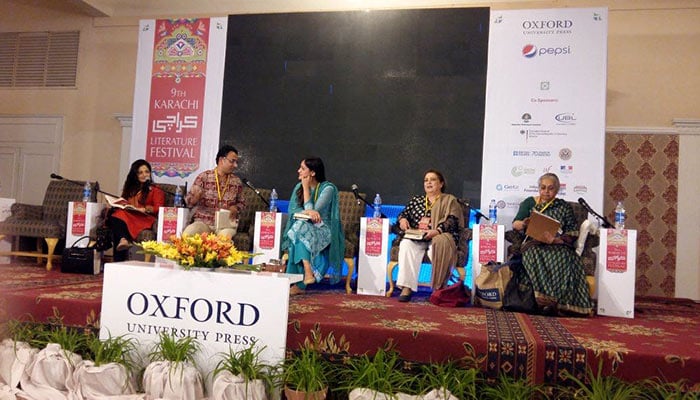'There are ways to transcend this border'
Indian author Aanchal Malhotra explores tales of Partition through objects

KARACHI: The importance of alternative history and recording personal accounts of events were the main themes at the launch of Indian author Aanchal Malhotra's book "Remnants of a Separation: A history of the Partition through material memory" at the 9th Karachi Literature Festival on Saturday.
The book offers a very distinct and unique perspective of history — unlocking 19 incredible stories of Partition, from both sides of the border, that were infused in objects.
"You cannot escape the impact of Partition if you are born in India or Pakistan," said Malhotra, whose both sets of grandparents migrated from Pakistan to India.
"Partition gave rise to incredible moments of sacrifice, friendship, courage, perseverance. This is why we must remember the divide," she contended.
Recalling how the idea of writing about a historical incident through objects struck her, the author said she inquired about a glass and a measuring scale belonging to her maternal grandfather in 2013. "All of a sudden, my grandfather got transported naturally to that [Partition] time and began sharing his story," said Malhotra, adding that she had never seen this kind of physical manifestation of memories.
The author said it was then that she thought others who experienced Partition may have similar memories attached with objects. Narrating the incident in her book, she writes: "This was the first time that the importance of material memory dawned on me — the ability of an object or a possession to retain memory and act as stimulus for recollection".
She explained further that not all objects are personal, but some, such as the shawl one wore on the journey through the border, or the kitchen utensil one used in the refugee camp for two months, hold special value as they are a part of that memory.
Talking about the importance of oral narratives, Malhotra said these are essential, as written or recorded history is the official version of events. She also explored how there can be varying accounts of the same event — how one journey can be told in several ways by those who experienced it, similar to Japanese director Akira Kurosawa's famous film Rashomon.
"The difficulty is that memory is not chronological so the stories are all over the place. You need triggers to remember," she argued.
"There are ways to transcend this border," said Malhotra while recounting a tale about how two families from across the border, who shared a house and had equally deep connections to it, were united after the Partition and had a combined sense of ownership.
When asked by an audience member about difficulties in getting elderly persons to open up about stories, Malhotra said at several times it seemed they would be revealing stories that possibly no one has heard before, admitting that it is a delicate path to tread on. Sharing her way of doing it, Malhotra said it helps to go to the person's level and talk about mundane things until they are comfortable opening up or sharing something that is as painful and personal with them first so there is a parity of sorts.
However, the author admitted that there were times she felt guilty about asking people to delve into memories that may make them uncomfortable or be painful.
The book stems from the author's master's of fine arts thesis, for which she also spent time in Lahore where she was assisted by The Citizens Archive of Pakistan, whose own Oral History Project records tales of Partition.
"During my time in Pakistan for the research I conducted for this book, Lahore embedded itself into the same place in my heart otherwise occupied with Delhi," she recalls in her book.
The book also contains a personal touch, with the first chapter detailing the Partition journey of the author's own family. Malhotra's paternal grandfather was from Mandi Bahauddin and grandmother from DI Khan while her maternal grandparents hailed from Lahore.
Malhotra, also an artist and oral historian, currently lives in New Delhi, where her family runs the Bahrisons Bookshop. She is also the co-founder of the Museum of Material Memory.
The session was hosted by Saif Mahmood, an author and advocate of the Indian Supreme Court, and included filmmaker Naz Ikramullah Ashraf and authors Shahnaz Aijazuddin and Reema Abbasi as panellists.